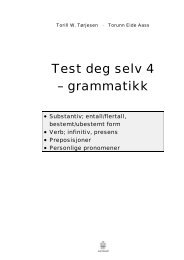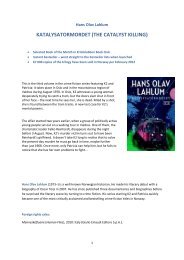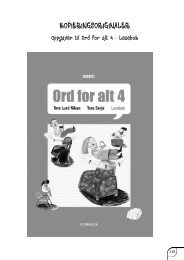Magazine 0205.indd - Cappelen Damm
Magazine 0205.indd - Cappelen Damm
Magazine 0205.indd - Cappelen Damm
Create successful ePaper yourself
Turn your PDF publications into a flip-book with our unique Google optimized e-Paper software.
Illustrasjon: Inger Dale<br />
C a p p e l e n s t i d s s k r i f t f o r e n g e l s k l æ r e r e<br />
nr02-2005<br />
01<br />
02<br />
03<br />
04<br />
05<br />
06<br />
07<br />
08<br />
09<br />
10<br />
11<br />
12<br />
13<br />
14<br />
15<br />
16<br />
17<br />
18<br />
19<br />
20<br />
21<br />
22<br />
23<br />
24
Leder<br />
Kjære leser<br />
I skrivende stund er det usikkert hva regjeringsskiftet vil<br />
innebære for Kunnskapsløftet, men for engelskfagets del<br />
er trolig det meste fastlagt. Vi har fått en ny læreplan<br />
for 1.–13. klasse, og vet nå hva vi har å forholde oss til i<br />
jobben vår med å utvikle læremidler.<br />
Vi som jobber med engelskbøker i <strong>Cappelen</strong>, har gått<br />
inn i reformarbeidet med klare ambisjoner om å følge<br />
opp intensjonene i den nye læreplanen. Dette har vært<br />
en spennende og til tider frustrerende prosess, da<br />
læreplanen gjennomgikk relativt store endringer i fasene<br />
fra høringsrunde og fram til planen forelå i endelig<br />
versjon. Men vi har nå kommet langt i arbeidet, og vi har<br />
ikke nøyd oss med å “fl ikke” på gamle suksesser. Vi er<br />
ganske stolte av det våre forfattere har fått til. Når dere<br />
mottar våre nye bøker i mars, vil dere selv kunne vurdere<br />
om vi har grunn til å være fornøyde.<br />
Noe av det morsomste med å utvikle nye læreverk er å<br />
introdusere nye forfattere med spennende perspektiver<br />
på engelskfaget. I vårt nye engelskverk for yrkesfagene,<br />
Tracks, har engelsklærere med mange års erfaring fra<br />
arbeid på yrkesfaglige studieretninger stått for innholdet.<br />
En av dem, Petter Fuhre fra Rosthaug videregående skole,<br />
kan du lese om i dette bladet.<br />
Noen kommer – og noen går. Mange av dere har trolig et<br />
forhold til Richard Peel, som har vært en særdeles aktiv<br />
lærebokforfatter i mange år. Nå har denne ekte britiske<br />
gentleman valgt å takke for seg i <strong>Cappelen</strong>. Vi ba ham om<br />
å skrive et lite avskjedskåseri for oss, og det kan du lese<br />
på s. 14.<br />
En annen Richard fra England har derimot endelig takket ja<br />
til å gå inn i forfatterrollen for fullt. Richard Burgess har,<br />
etter lang tids “oppvartning” fra ivrige forlagsredaktører,<br />
det siste året jobbet sammen med Theresa Bowles Sørhus<br />
med å utvikle en ny utgave av Passage. Vi gir dere en<br />
smakebit på Richards skrivekunster i dette nummeret.<br />
Forhåpentlig vil dere ha litt glede av [ mægəzi:n] i<br />
høstmørket. Vi sees på kurs når sola begynner å varme<br />
igjen!<br />
03<br />
07<br />
10<br />
14<br />
[ mægəzi:n]<br />
CAPPELEN UNDERVISNING<br />
videregående skole,<br />
Postboks 350 Sentrum,<br />
0101 Oslo<br />
Telefon: 22 36 51 95/5177<br />
E-post: birger.nicolaysen@cappelen.no<br />
innhold<br />
06<br />
08<br />
12<br />
English Monarchs<br />
By Richard Burgess<br />
Ny alumnusforening for engelsk ved<br />
Universitetet i Oslo<br />
Read It!<br />
By John Anthony<br />
On leaving stable<br />
By Richard Peel<br />
16 Ny skoleordbok<br />
Ansvarlig redaktør:<br />
Birger Nicolaysen<br />
Redaksjon:<br />
Kirsten Aadahl<br />
Produksjon: PrePress as<br />
Petter Fuhre – språkmektig<br />
musiker, lærer og lærebokforfatter<br />
Notiser:<br />
Smått og stort om engelskfaget<br />
When English was a truly foreign<br />
language<br />
By Siri Hundstadbråten
ENGLISH<br />
MONARCHS<br />
By Richard Burgess<br />
King Arthur and his Round Table<br />
Boudicca (1st century AD) – Celtic warrior<br />
queen<br />
In the beginning there was no England,<br />
Scotland or Wales. There was Britannia. Or, at<br />
least, that was what the Romans called the<br />
windswept island they occupied in AD 43. The<br />
native Britons were, of course, not pleased to<br />
see the Romans and put up fi erce resistance.<br />
None was fi ercer than Boudicca, queen of the<br />
Iceni tribe. She was a widow who had inherited<br />
her husband’s power and rights, and demanded<br />
recognition from the Romans. Women’s<br />
liberation had not caught on in Rome and it<br />
was decided that she should be put in her<br />
place. Boudicca was publicly beaten and her<br />
daughters raped.<br />
But the Romans had made a big mistake.<br />
Boudicca’s revenge was swift and terrible. By<br />
all accounts she was a terrifying spectacle<br />
- very tall with a loud, harsh voice and a mass<br />
of red hair hanging down to her hips. First<br />
she took the Roman town of Colchester and<br />
slaughtered its inhabitants. Then she moved<br />
on to London, which she razed to the ground.<br />
But she knew victory could not last. When the<br />
Richard Burgess er født i Dover i England i 1956<br />
og fl yttet til Norge i 1976. Han jobber som lektor<br />
ved Fredrik II videregående skole i Fredrikstad<br />
og ved Høgskolen i Østfold. Han har tidligere<br />
vært forfatter av en av bøkene i <strong>Cappelen</strong>s serie<br />
American Ways (engelsk for yrkesfag). Richard har<br />
også utgitt fl ere bøker på sitt eget forlag – Fredrik<br />
Forlag – og har hatt diverse frilansoppdrag, bl.a. i<br />
Undervisningsradioen.<br />
Sammen med Theresa Bowles Sørhus er Richard<br />
forfatter av den nye utgaven av Passage, skrevet for<br />
Vg1 på studiespesialiserende utdanningsprogram.<br />
fi nal showdown with the Roman army came,<br />
she poisoned herself and her daughters rather<br />
than submit.<br />
Arthur (5th century AD) – the resistance<br />
fi ghter who became a mythical hero<br />
Everyone has heard of King Arthur. Most<br />
people have heard stories or seen fi lms about<br />
the castle at Camelot, the wizard Merlin,<br />
the sword Excalibur etc. Well, most of this<br />
belongs to the world of romance and was<br />
invented by writers the 19th century. But Arthur<br />
seems to have been a real person too. The real<br />
Arthur (or Artorius) belongs to a period that<br />
is often called the Dark Ages for the simple<br />
reason that we know so little about it.<br />
The Dark Ages start around AD 410 with the<br />
withdrawal of Roman soldiers from Britain.<br />
By now the Celtic Britons had become very<br />
sophisticated in their tastes and ways,<br />
living in towns, enjoying theatre, hot baths<br />
and a well-organized society. But these were<br />
troubled times with Germanic tribes looking<br />
for new lands to conquer. Without the Roman<br />
army the British were defenceless, and soon<br />
waves of Angles and Saxons arrived from<br />
over the North Sea. The newcomers were not<br />
interested in theatre – and even less in hot<br />
baths. In British eyes they were a bunch of<br />
hooligans. Unfortunately they were also armed<br />
to the teeth…<br />
It is in this struggle against the tide of<br />
invasions that a real-life Arthur appears.<br />
We know very little about him, other than<br />
that he became an important fi gure in British<br />
resistance to the invaders. According to one<br />
source he fought and won twelve battles<br />
against the Saxons. But in the long run it was<br />
a lost cause. In fact, to this day, the Welsh<br />
word for England – Lloegyr – means “the lost<br />
lands”.<br />
01<br />
02<br />
03<br />
04<br />
05<br />
06<br />
07<br />
08<br />
09<br />
10<br />
11<br />
12<br />
13<br />
14<br />
15<br />
16<br />
17<br />
18<br />
19<br />
20
01<br />
02<br />
03<br />
04<br />
05<br />
06<br />
07<br />
08<br />
09<br />
10<br />
11<br />
12<br />
13<br />
14<br />
15<br />
16<br />
17<br />
18<br />
19<br />
20<br />
William the Conqueror (1027-1087)<br />
If there is one date that every English person<br />
knows, it is 1066 – the date of the Battle of<br />
Hastings. The last successful invasion of<br />
Britain, it was an event that changed the<br />
country for ever. The invaders came from<br />
across the Channel in Normandy. Their leader<br />
was one Guillaume, called William the<br />
Bastard by his English enemies, but forever<br />
remembered as William the Conqueror. Not<br />
only did he claim direct descent from the dead<br />
English king, he said that his rival claimant,<br />
Earl Harold of Wessex, had promised him<br />
allegiance. Harold denied any such thing. The<br />
two huge armies met at a place near Hastings<br />
now known as Battle. It was a close-run thing,<br />
lasting for six hours. At the end of the day it<br />
was the Normans superior cavalry that tipped<br />
the balance. Harold was killed, possibly with<br />
an arrow in the eye.<br />
William the Conqueror, king of England 1066–1087<br />
England became an occupied country with<br />
French the new language of administration<br />
and power. It took several generations before<br />
the distinction between occupier and occupied<br />
became blurred and before the population<br />
began to speak the same tongue. Ironically it<br />
was English that won, although it was a new,<br />
improved English – full of French loanwords.<br />
Henry VIII (1491-1547) – the king who<br />
broke with Rome<br />
In the 14th century winds of religious change<br />
were blowing over Europe. People like Martin<br />
Luther were questioning the authority of the<br />
Church and starting their own “protestant”<br />
forms of Christian worship. We call this<br />
period the Reformation. In England the young<br />
King Henry VIII was a strong supporter of the<br />
Catholic Church and opposed to mad, newfangled<br />
ideas like translating the Bible into<br />
English so that everybody could understand<br />
it. In fact, he was happy to burn people at the<br />
stake for suggesting such things.<br />
Odd then that Henry VIII should be<br />
remembered chiefl y as the king who broke with<br />
Rome and the Catholic Church. The reason<br />
for his change of heart was that he had tired<br />
of his fi rst wife, the Spanish Catherine of<br />
Aragorn. Not only was she not as young and<br />
pretty as his mistress, Ann Boleyn, but more<br />
importantly she had been unable to give<br />
him what he desired most: a son. When the<br />
Pope refused his request for a divorce, Henry<br />
declared himself head of the English church<br />
– the Church of England or the Anglican Church<br />
as we know it today.<br />
Ann soon bore him a child – a daughter. The<br />
king – now immensely fat and bad-tempered<br />
– suspected her of adultery and had her<br />
executed. During his life Henry had altogether<br />
six wives. Two he divorced, two were executed,<br />
one died in childbirth (a son!) and one survived<br />
him. By all accounts he wasn’t an easy man to<br />
live with.<br />
Elizabeth I (1533-1603) – the Virgin<br />
Queen<br />
If only Henry had known that the best-loved<br />
monarch of them all, with a historical period<br />
named after her, would be his daughter.<br />
Elizabeth, born of poor Ann Boleyn, reigned for<br />
45 years and the Elizabethan period is one of<br />
the most exciting in English history. It saw<br />
England become a world power, defeating its<br />
arch-enemy Spain and establishing colonies<br />
in America. It was the period when William<br />
Shakespeare wrote the plays and poems that<br />
he is still famous for today.<br />
At the centre of it all was Elizabeth, looking<br />
like a goddess in her extravagant dresses and<br />
with her face powdered white. Intelligent and<br />
well-educated, she liked the company of men,<br />
Queen Victoria, queen of England 1837–1901, empress of India 1876–1901<br />
but she never married. The new colonies in<br />
America were named Virginia in honour of the<br />
Virgin Queen. As for behaving like a monarch,<br />
her father need not have worried. Elizabeth<br />
managed to turn her sex to an advantage.<br />
When the huge Spanish Armada was on its way<br />
to attack England, she held a famous speech<br />
at Tilbury Dock in London, dressed in armour<br />
like a new Boudicca. “I know I have the body<br />
of a weak and feeble woman,” she cried, “but I<br />
have the heart and stomach of a king, and of a<br />
king of England too.” The crowd loved it!<br />
George III (1738-1820) – the king who<br />
talked to trees<br />
It is not very fl attering to be remembered as<br />
the king who lost the American colonies and<br />
talked to trees, but that is the unlucky fate<br />
of George III. In fact, it’s very unfair too,<br />
because during his reign Britain actually<br />
became stronger than ever before. True, the<br />
American colonies were lost when colonists<br />
decided they had had quite enough of English<br />
taxes and declared independence. But it was<br />
also during his reign that Britain defeated<br />
Napoleon and became the leading world power.
As for talking to trees, it was one of the more<br />
innocent things that George III did during the<br />
bouts of madness that affl icted him during his<br />
59-year reign. He could be violent and abusive<br />
too, and had to be bound in a straitjacket to<br />
restrain him. The madness of the king was no<br />
secret, and for the last nine years of his life<br />
his son, who later became George IV, had to<br />
rule as Prince Regent.<br />
Victoria (1819- 1901) – Empress and<br />
Mother<br />
Victoria was queen for 63 years and gave her<br />
name to a period which is still important for<br />
modern Britons. This was when Britain became<br />
the world’s leading industrial power and the<br />
centre of a huge empire. By the end of her<br />
reign she was Queen and Empress of a quarter<br />
of the world’s population.<br />
When she came to the throne in 1837, a mere<br />
18 years old, the monarchy was having a very<br />
bad press. Many people had come to associate<br />
it with it unnecessary expense and sexual<br />
scandals. (Does that ring a bell?) Young<br />
Victoria was determined that she would be<br />
a role model for her people. Family values,<br />
strict Christian morality and hard work<br />
were central to her public image. She and<br />
her beloved German husband Albert had nine<br />
children, many of whom married into European<br />
monarchies. When Albert died of typhoid in<br />
1861, Victoria was devastated and spent the<br />
rest of her life in mourning, out of the public<br />
eye.<br />
Edward VIII (1894 – 1972) – the King<br />
who chose not to be<br />
You may not be able to apply for the job of<br />
monarch, but you can hand in your resignation.<br />
Edward VIII did just this. When the dashing<br />
prince succeeded to the throne in 1936 it<br />
was well-known secret that he was having<br />
an affair with Wallis Simpson, the wife of an<br />
American businessman. When she divorced her<br />
husband, Edward VIII planned to marry her.<br />
But his government were strongly against the<br />
idea, arguing that the British public would<br />
never accept Mrs Simpson as Queen. Faced<br />
with the choice between losing the crown or<br />
the woman, he chose the former. “I have found<br />
it impossible” he said in a moving speech at<br />
his abdication, “to carry the heavy burden of<br />
responsibility and to discharge my duties as<br />
King as I would wish to do without the help<br />
and support of the woman I love.”<br />
It has only recently come to light why the<br />
government was so opposed to the marriage.<br />
The fact that she was a twice-divorced<br />
American was just half of the story, it seems.<br />
According to FBI reports, Mrs Simpson had<br />
strong links to Nazi Germany and was even<br />
rumoured to be having an affair with the<br />
German Ambassador in London.<br />
Edward and Mrs Simpson – the Duke and Duchess of Windsor<br />
Queen Elizabeth II<br />
Elizabeth II (1926 -)<br />
Royal affairs and infi delities used to be<br />
the stuff of rumour. In the modern media<br />
world it is the stuff of fat headlines and<br />
paparazzi photographers. Pity, then, poor<br />
Elizabeth II, head of a Royal Family where<br />
such scandals have become a way of life.<br />
Her sister Margaret’s diffi cult love-life was<br />
constantly in the news. Of her four children,<br />
three are divorced. Charles’ rift with Diana<br />
was particularly painful and public, and<br />
when Diana later died in a car accident the<br />
reputation of the Windsors hit an all-time low.<br />
In the midst of it all, though, the Queen has<br />
kept her popularity. Her own private life – and<br />
her relationship with her gaffe-prone husband,<br />
Prince Philip – is seldom criticised, and most<br />
people agree that she works very hard. She<br />
spends about three hours a day on paper work<br />
alone and is the most widely-travelled headof-state<br />
in the world. After half a century<br />
on the throne many wonder how the British<br />
monarchy will survive without her.<br />
01<br />
02<br />
03<br />
04<br />
05<br />
06<br />
07<br />
08<br />
09<br />
10<br />
11<br />
12<br />
13<br />
14<br />
15<br />
16<br />
17<br />
18<br />
19<br />
20
01<br />
02<br />
03<br />
04<br />
05<br />
06<br />
07<br />
08<br />
09<br />
10<br />
11<br />
12<br />
13<br />
14<br />
15<br />
16<br />
17<br />
18<br />
19<br />
20<br />
Petter Fuhre<br />
Den unge Rosthaug-læreren Petter Fuhre nøyde<br />
seg ikke med å spille en CD for elevene da Irland<br />
dukket opp på pensum. Han tok heller gitaren fatt,<br />
lærte seg sangen i læreboka, og fremførte den i<br />
klasserommet.<br />
- Det skjedde noe med meg der. Jeg ble så fascinert<br />
av melodiene og stemningene i musikken. Det<br />
ble starten på et årelangt dykk i irsk og skotsk<br />
musikkskatt, forteller musikeren fra Åmot. Snart<br />
fi kk han med seg fl ere, og nå kan bandet Killieburne<br />
Brae se tilbake på fi re år med rivende utvikling<br />
som irsk folkrockband. – Den perfekte pub- og<br />
konsertopplevelse, lover Petter.<br />
Øre for språk<br />
Selv mener musikeren og språklæreren at det er<br />
sammenheng mellom musikaliteten og språkøret<br />
hans. - Språk er på mange måter musikk. Å oppfatte<br />
språk dreier seg blant annet om å oppfatte lydene<br />
og melodiene i språket, proklamerer 35-åringen, som<br />
lever med musikk hele tiden. Alltid trommer han<br />
med fi ngrene på arbeidspulten, og alltid tenker han<br />
nye arrangementer.<br />
Men at han kunne vandret rett inn i et av dronning<br />
Elizabeths teselskaper med sin Queen´s English,<br />
slik en av engelsklærerkollegene hans mener, vil<br />
han ikke høre på. – Toppen RP, sier Petter, som<br />
etter å ha fl ørtet litt med Cockney-aksenten en<br />
tid, bestemte seg for å forene musikklidenskap og<br />
engelskuttale.<br />
Frelst på Irland<br />
Nå er det irsk som står på tapetet, og ikke et<br />
middelmådig irsk.<br />
- Målet er å lære meg å snakke med vestirsk aksent.<br />
Det er den mykeste og vakreste engelsken jeg kan<br />
tenke meg, forteller han. For å nøre opp under<br />
Irlandsfascinasjonen hans sendte skolen ham på<br />
kurset ”Absorbing Ireland”, i Irland.<br />
– Rafterys kurs for engelsklærere er vel nokså kjent<br />
blant norske lærere nå, og kan på det varmeste<br />
anbefales, mener Petter. Irsk kultur er fantastisk.<br />
Det er noe i væremåten og sjargongen. Menneskene<br />
er så vennlige og pratsomme, sier irlandselskeren.<br />
Irland har også satt sitt preg på yrkesfagdelen av<br />
det nye læreverket:<br />
- Et av kapitlene dreier seg om Séan fra Galway.<br />
Han spiller blant annet tinnfl øyte, som er<br />
favorittinstrumentet mitt, sier Petter med et fl ir.<br />
Beskjeden lærer<br />
Pratsom er Petter selv stort sett bare i trygge<br />
omgivelser.<br />
- Jeg trives på scenen, men blir stille i sosiale<br />
sammenhenger med mange ukjente, bekjenner han.<br />
Likevel bestemte han seg tidlig for å bli lærer.<br />
- Jeg begynte å observere lærerne mine i<br />
begynnelsen av videregående. Noen sier at nivået<br />
Nye læreverk gir muligheter for å introdusere nye og spennende forfattere. [ ' mægə'zi:n]<br />
har snakket med Petter Fuhre fra Rosthaug videregående skole. Petter er hovedforfatter av<br />
engelskbøkene for teknikk og industriell produksjon og elektrofag.<br />
har sunket i skolen, men nivået på hva? Evnen til<br />
å hoste opp ferdigtygde faktakunnskaper? Selv<br />
tror han ungdommenes evne til samarbeid og til<br />
å tenke kreativt er bedre nå enn da han gikk på<br />
videregående skole. Elever i dag stiller nok høyere<br />
krav til variasjon og dynamikk i undervisningen.<br />
Det henger sammen med samfunnet for øvrig, der<br />
øyeblikksunderholdning preger hverdagen – på<br />
godt og vondt. Samtidig viser elevundersøkelser<br />
at tradisjonell tavleundervisning er savnet når<br />
prosjekt-hype og “learning by doing” har tatt helt<br />
av.<br />
Variasjon og mangfold har vært ledetråder for<br />
arbeidet med det nye læreverket, i både tekster og<br />
oppgaver. Ikke minst er dette viktig i en lærebok for<br />
yrkesfag, mener Petter. Det betyr imidlertid ikke at<br />
lærestoffet skal gjøres banalt. Mek-elever hevdes<br />
å ha intellektet i håndleddet. Dette er selvfølgelig<br />
like fl åsete som det er feil. På Rosthaug leser<br />
Petters VK1 Kjøretøy Hamlet.<br />
- Også yrkesfagelever takler autentisk engelsk,<br />
ingen tvil. Forenklet engelsk kan faktisk virke<br />
uinspirerende og nesten fordummende. Men<br />
autentiske tekster bør være relativt korte. Det har<br />
vi tatt hensyn til i den nye boka.<br />
Indianere<br />
Petter tegnet mye da han var gutt, før musikken tok<br />
ham.<br />
- Jeg tegnet det jeg var opptatt av: KISS, dinosaurer<br />
og indianere. Indianerne danner en egen epoke i<br />
musikerlærerens liv.<br />
- Vi var et par stykker som konkurrerte om å skrive<br />
de lengste og mest dramatiske stilene på skolen.<br />
Den nye læreplanen har et punkt om urbefolkning<br />
som jeg ønsker velkommen. Det å lese litteratur<br />
skrevet fra maoriens eller aboriginerens ståsted gir<br />
oss vestlige nye, sunne perspektiver.<br />
Skriving av lærebok<br />
Vi er nysgjerrige på hvordan Petter reagerte da han<br />
fi kk tilbud om å skrive lærebok.<br />
- I utgangspunktet ble jeg invitert til å være med<br />
i en konsulentgruppe og ante lite om omfanget.<br />
Trodde det ville dreie seg om korrekturlesing,<br />
oppgaveideer og lignende. Det å få hovedansvaret<br />
for en av yrkesretningene kom først som et lite<br />
sjokk, som raskt ble erstattet av iver og ambisjon<br />
og inspirasjon. Og en hel del ydmykhet for et tungt<br />
fagfelt og et ansvarsfylt oppdrag.<br />
Ikke alt har vært like enkelt i manusarbeidet, synes<br />
Petter. - Vi har latt yrkesfagkapitlene dreie seg om<br />
fi re personer i den engelsktalende verden, for å gjøre<br />
stoffet interessant og virkelighetsnært. Dette har<br />
skapt utfordringer mht. autentisitet og språklig<br />
nivå tilpasset norske elever. Tommy fra Sydney har<br />
jo ikke norske elever i tankene når han prater med<br />
formannen på skipsverftet.<br />
Petter lyser opp når vi spør hva som har vært de<br />
morsomste erfaringene så langt.<br />
- Uten tvil selve skrivingen. Og diskusjonene i<br />
lærebokgruppa. Vi har hatt – og har – et svært<br />
fruktbart samarbeid, som helt klart gir bedre bøker.<br />
Nå er forfatterne svært spent på reaksjonene på<br />
bøkene.<br />
- Selvfølgelig er vi det – av fl ere årsaker. Læreres og<br />
elevers oppfatninger er slett ikke alltid like. Men<br />
det er her variasjon og mangfold er så viktig. Jeg er<br />
overbevist om at alle vil bli fornøyd med mye. Det er<br />
jo det vi har hatt som mål gjennom hele prosessen.<br />
- Det blir også spennende å se hvordan de<br />
forskjellige bøkene på markedet vil se ut. Den nye<br />
læreplanen er ikke like spesifi kk på omfanget av<br />
yrkesbiten i læreverket (jf. 40–60 % i gammel<br />
læreplan). Derfor kan vi få se vidt forskjellige<br />
tilbud. Vi har imidlertid jobbet ut fra det syn at det<br />
yrkesfaglige er helt essensielt i læreverk for elever<br />
på YF. Det er også interessant for elevene.<br />
Jeg håper og tror vi lykkes med målsettingene for<br />
det nye læreverket, sier Petter, som gjerne vil at<br />
vi får med at det har vært viktig for forfatterne<br />
å ta den nye læreplanen på alvor, å gi et enda<br />
videre omfang av yrkesfaglige temaer, å skape nye,<br />
inspirerende og utfordrende tekster og oppgaver, og<br />
å legge best mulig til rette for elever på forskjellig<br />
nivå.<br />
Våren 2006 kommer Tracks,<br />
<strong>Cappelen</strong>s nye læreverk for<br />
engelsk på yrkesforberedende<br />
utdanningsprogram. Læreverket er<br />
skrevet etter ny læreplan i engelsk<br />
og har egne bøker for følgende<br />
yrkesfag:<br />
• Bygg- og anleggsteknikk<br />
• Design og håndverk<br />
• Elektrofag<br />
• Helse- og sosialfag<br />
• Medier og kommunikasjon<br />
• Naturbruk / Restaurant- og<br />
matfag<br />
• Service og samferdsel<br />
• Teknikk og industriell<br />
produksjon
Ny alumnusforening for engelsk<br />
ved Universitetet i Oslo<br />
Har du tråkket rundt her noen år?<br />
Da er kanskje denne foreningen<br />
noe for deg!<br />
Medlemskap er gratis, og registreringen enkel. Den<br />
gjøres på følgende måte:<br />
14<br />
- Gå til http://alumnus.uio.no<br />
- Les demoen, eller gå direkte til Bli medlem.<br />
- På første Bli medlem-side velges<br />
Alumnusforeningen for engelsk.<br />
- På neste side fyller man inn de relevante<br />
opplysningene. Disse kan siden enkelt endres.<br />
- Klikk Lagre, og det er det!<br />
- Man får umiddelbart tilsendt passord via<br />
e-post. Dette kan også endres etter behag.<br />
Brukernavnet er e-postadressen.<br />
Engelskavdelingen ved Institutt for litteratur,<br />
områdestudier og europeiske språk ønsker<br />
sine alumner velkommen inn i den nye<br />
Alumnusforeningen for engelsk!<br />
”Alumnus” er latin for ”tidligere elev”, og foreningen<br />
er ment som et samlingspunkt for tidligere studenter,<br />
nåværende masterstudenter og ansatte, til faglig og<br />
sosial vederkvegelse. Gjennom foreningen kan man<br />
holde kontakt med sine studievenner, få siste nytt<br />
fra instituttet, abonnere på UiOs magasiner, delta på<br />
faglige og sosiale arrangementer, stille spørsmål,<br />
debattere, få tilgang til fagstoff, eller bidra selv med<br />
fagstoff. Meningen er at foreningen skal være dynamisk<br />
begge veier, slik at det ikke blir enveiskommunikasjon<br />
fra instituttet til alumnene, men også andre veien.<br />
Samfunnskontakt er et satsningsområde for UiO, og<br />
alumnusnettverkene er en del av denne satsningen.<br />
Engelskavdelingen er fornøyd med å være blant de<br />
første som starter opp, og håper på god respons fra<br />
alumnene.<br />
Den nye foreningen er en videreføring av IBAlumni som<br />
ble startet ved IBA i 2001. Det viste seg imidlertid at<br />
det var vanskelig å administrere foreningen uten en<br />
god teknologisk plattform, så foreningen ble lagt på<br />
is inntil videre. Nå er den teknologiske plattformen på<br />
plass, og avdelingen ser frem til å videreutvikle dette<br />
møtestedet.<br />
For å bli medlem i foreningen må man ha hovedfag i<br />
engelsk fra UiO, eller en mastergrad med engelskfaglig<br />
studieretning innenfor studieprogrammene Europeiske<br />
og amerikanske studier, Språk, Litteraturstudier eller<br />
Lærerutdanningen. Hvis man ikke oppfyller kravene<br />
for medlemskap, men har en sterk interesse for faget<br />
og et stort ønske om å bli medlem, kan man søke om<br />
medlemskap på særskilt grunnlag.<br />
01<br />
02<br />
03<br />
04<br />
05<br />
06<br />
07<br />
08<br />
09<br />
10<br />
11<br />
12<br />
13<br />
14<br />
15<br />
16<br />
17<br />
18<br />
19<br />
20
Notiser:<br />
smått og stort<br />
om engelskfaget<br />
For første gang siden<br />
1995 blir det nå mindre populært å studere i utlandet, og det viser seg at<br />
det er studier i engelskspråklige land som opplever det største frafallet.<br />
Lånekassen melder at nedgangen i antall norske gradsstudenter i utlandet<br />
har sunket med litt over sju prosent det siste året. På de siste tre årene er<br />
andelen elever som reiser til engelskspråklige land redusert med 25<br />
prosent.<br />
Størst er nedgangen for USA, som har opplevd en halvering av<br />
norske studenter i løpet av en femårsperiode, melder ANB. Nedgangen<br />
skyldes ifølge Lånekassen den nye finansieringsordningen som regjeringen<br />
innførte i høst. Studenter i engelskspråklige land vil med ny ordning sitte<br />
igjen med en gjeldsbyrde på opptil 400 000 kroner for en treårig grad,<br />
hevder utenlandsstudentenes interesseorganisasjon ANSA.<br />
I forrige nummer<br />
av dette bladet ble det i denne spalten referert til en<br />
europeisk undersøkelse som viste at norske elever er<br />
helt i toppsjiktet i Europa når det gjelder engelskferdigheter.<br />
Nå viser en doktoravhandling utført av<br />
Glenn Ole Hellekjær ved Høgskolen i Østfold, at mange<br />
norske studenter får store problemer med engelsk fagspråk<br />
når de begynner på høyere utdanning. En tredjedel<br />
av studentene har vansker med å lese engelsk faglitteratur,<br />
ifølge tester Hellekjær har gjort.<br />
Hellekjær hevder derfor at engelskfaget i videregående<br />
skole må endres hvis elevene skal kunne møte kravene<br />
i videre utdanning. “Undervisningen må i langt større<br />
grad legge vekt på leseglede og mengdelesing av lengre<br />
tekster.<br />
De som har lest mye, har en bedre evne til å forstå<br />
betydningen av nye ord ut fra lesesammenhengen,”<br />
uttaler han til Aftenposten 14. september.<br />
En annen<br />
nordmenn beherske<br />
sor i statsvitenskap<br />
illusjon i dette land<br />
i Aftenposten 7. okto<br />
norwenglish”. Hagtve<br />
norske bedrifter som<br />
konsernspråk. Da bur<br />
holde standarder, fore<br />
politikere, akademike<br />
på engelsk. Hagtvet m<br />
som er korrekt engelsk<br />
Resultatet av dette er<br />
pidgin-engelsk, eller en
som har gått hardt ut mot forestillingen om at<br />
r engelsk på en god måte, er Bernt Hagtvet, profesved<br />
Universitetet i Oslo. “Vi nærer en alvorlig<br />
et: Vi tror vi kan engelsk,” skriver han i en kronikk<br />
ber, med den talende tittelen “Trusselen fra<br />
t er svært skeptisk til den rådende trenden der<br />
Statoil går over til å bruke engelsk som internt<br />
e kanskje Statoil leie inn filologer for å opprett-<br />
slår han, og minner om hvor hjelpeløse norske<br />
e og forretningsfolk blir når de skal kommunisere<br />
ner nordmenn mangler ydmykhet overfor hva<br />
og vilje til å motta kritikk for dårlig språkbruk.<br />
at vi konstruerer en egen variant av kolonitidens<br />
norsk pomor-engelsk.<br />
Læreplanen for engelsk programfag er nå til høring. I læreplanutkastet<br />
står følgende formulering:<br />
“Samfunnsfaglig engelsk og litteratur og kultur bygger på<br />
internasjonal engelsk.”<br />
Vi har fått bekreftet fra ellers sikre kilder at dette betyr at det<br />
vil bli følgende struktur på engelsk programfag:<br />
Vg1: elevene må velge internasjonal engelsk (5 timer)<br />
Vg2: elevene velger enten samfunnsfaglig engelsk (5 timer)<br />
eller litteratur og kultur (5 timer)<br />
Dersom en elev kun skal ha internasjonal engelsk, kan dette<br />
kurset velges på Vg3.<br />
Dette innebærer en klar endring i forhold til førsteutkastet til<br />
ny læreplan (jf. forrige nummer av [ mægəzi:n]), der ideen var<br />
at samtlige kurs kunne velges av elever fra alle studieforberedende<br />
utdanningsprogram på alle årstrinn, inkludert Vg1.<br />
At engelsk språkbruk brer om seg i samfunnet, ser<br />
vi ikke minst i næringslivet. I utdanningsmagasinet<br />
Kaleidoskopet kan vi lese om hvordan norske selskaper<br />
konstruerer stadig nye titler til sine ansatte,<br />
og disse titlene skal selvsagt være engelske.<br />
Northern Europe External Relations Senior Manager<br />
og Area Sales Manager Business Travel Norway<br />
er eksempler på dette. Ifølge Nils M. Sortland,<br />
Universitetslektor i organisasjonspsykologi, gjør<br />
en engelsk tittel at en stilling virker større og mer<br />
meningsfull. Man er en del av et globalt nettverk og<br />
kan sammenlikne seg med personer man ser opp til,<br />
på samme måte som barn ser opp til popstjerner.<br />
Jobbtitler brukes ofte for å oppnå tyngde overfor<br />
kunder. Men Sortland advarer mot inflasjon i flotte<br />
titler: “Dersom tittelen ikke står til arbeidstakerens<br />
funksjoner, får det motsatt virkning,” påpeker<br />
han.
10<br />
Read It!<br />
Reviewed It! Read<br />
The Closed Circle<br />
By Jonathan Coe<br />
Some of you might remember my<br />
review of The Rotters’ Club in the<br />
last edition of the magazine. I<br />
promised to review the sequel The<br />
Closed Circle in the next edition<br />
and quite surprisingly my editor<br />
agreed. If you remember, The<br />
Rotters’ Club was Jonathan Coe’s<br />
story of a group of young people<br />
attending King Edward’s School in<br />
Birmingham. This is a novel about<br />
adolescents in school and about<br />
Britain and Birmingham in the<br />
1970s that can interest our pupils<br />
because it has a perspective on<br />
life of people their age, shows life<br />
in a British school and informs us<br />
about a volatile period in recent<br />
British history. The novel ends with<br />
two hopeless predictions by one<br />
particularly visionary-challenged<br />
character, Sam Chase. One was that<br />
the quiet and introspective Benjamin<br />
Trotter would win the girl of<br />
his dreams, Cicely, and the other<br />
was that Margaret Thatcher would<br />
never become Prime Minister.<br />
When we return to the characters in The Closed<br />
Circle, 25 years on, Thatcher is long gone, but<br />
only after many turbulent (many would say<br />
destructive) years as Prime Minister and Cicely,<br />
who disappeared from Benjamin’s life, is still<br />
nowhere to be found. The main characters of The<br />
Rotters’ Club, who worked on the school paper<br />
together, have gone their separate ways and are<br />
now in their forties: Emily is an eager Christian<br />
and married, more or less, to Benjamin; Claire<br />
is recovering from a traumatic relationship with<br />
a married Italian and appears to be a restless<br />
wanderer; Doug has landed a top job as a political<br />
columnist on a major newspaper and judges the<br />
world with a sardonic eye while comfortably<br />
married into the upper class; and the youngest<br />
Trotter, Paul, the over-confi dent and smug one, is<br />
a New Labour MP, what else would he be ?<br />
The story starts with Claire writing an imaginary<br />
letter to her still missing sister (the mixture of<br />
narrative styles is continued from the fi rst book).<br />
We then meet Benjamin again. His marriage to<br />
Emily is failing and he falls in love with a young<br />
woman, Malvina, in a bookshop. Unfortunately,<br />
Benjamin’s head is still in the clouds and Malvina<br />
turns around and falls for his brother Paul, the<br />
aforementioned Labour MP, which of course<br />
threatens his marriage. The characters certainly<br />
refl ect the times.<br />
The framework of the novel is still Ben’s niece<br />
revealing much of the story from what she has<br />
heard and learned about by paying impossibly<br />
close attention to family details. The times are<br />
still volatile, but now there are demonstrations<br />
against the threatened closure of the Birmingham<br />
Rover factory, a smashed-up McDonald’s, the<br />
return of far-right politics, September 11, war in<br />
Afghanistan, the war in Iraq. Coe also returns<br />
to his theme of how the terrible things we are<br />
capable of doing in this world have far greater<br />
effects than we probably imagined. For example,<br />
Lois, Benjamin’s sister, never recovers from the<br />
IRA pub bombing in 1970s Birmingham, remaining<br />
a shattered victim of other people’s important<br />
causes and disaffection. Of this Claire says: “And<br />
I started thinking of all the other families, all the<br />
by John Anthony<br />
other people, whose lives must have been touched<br />
by that event, and how you could go mad trying to<br />
trace the thing back to its source…”<br />
From being dreamy kids high on hormones and<br />
somewhat innocent and ignorant of their world,<br />
the characters are now struggling with the<br />
responsibilities and problems of adulthood.<br />
Benjamin is searching for himself in vain, Doug<br />
is assigned to a new post, literary editor, the<br />
political journalist’s equivalent to being sent to<br />
Siberia, and Paul is pursuing his directionless<br />
career in New Labour. We see the characters dealing<br />
with sadness, loss and lack of accomplishment,<br />
and struggling to understand a world they<br />
neither expected nor really wanted. Benjamin,<br />
who was going to be a writer and composer, is an<br />
accountant, yikes!<br />
The book still has its charms, but to enjoy it, the<br />
reader has to have read The Rotters’ Club fi rst.<br />
The characters will be more understandable and<br />
the reader will be more interested in their fates.<br />
But in some ways the book is more about Britain<br />
in the 90s than about the characters, and it is<br />
perhaps here that Coe still shows some literary<br />
magic, although even here the social criticism<br />
feels a little perfunctory at times. I get<br />
the impression that Coe is a little tired of his<br />
characters and is more on the mark and funny<br />
when he is looking at our contemporary world. For<br />
example, Paul has great trouble trying to explain<br />
Tony Blair and how the Labour party leader ended<br />
up more like a neoconservative servant of the US<br />
Republican President than the leader of a once<br />
grand socialist movement. We are also witness<br />
to a world quickly losing sight of integrity and<br />
ethics as fat-cat executives are extravagantly<br />
rewarded for their business failures, golden<br />
handshakes and all.<br />
Now in their forties, the lives these characters<br />
lead are, well, rather glum, and the views they<br />
have on the contemporary world refl ect, well, the<br />
teacher’s generation, with a mixture of regret<br />
and disbelief at what the world has become. Coe<br />
examines this on the political and social level,<br />
looking at road rage, for example, and marveling
at how much a café dares to charge for a coffee<br />
and bagel (and even gets away with it). As our<br />
pupils are also often very critical of modern<br />
society, they should enjoy these insights and<br />
comments.<br />
Having mentioned some reservations I have to<br />
admit that the book still has interesting and<br />
entertaining observations of our contemporary<br />
times. In one passage Doug is witness to the new<br />
class of celebrity at a club:<br />
…His gaze was fi xed, instead, on a scene<br />
unfolding in the corner of the restaurant<br />
nearest to the entrance, where the young<br />
couple who had arrived just behind Paul in a white<br />
stretch limo were enjoying the attentions of a<br />
crowd of journalists and photographers. This<br />
couple, whom Paul had not recognized, had last<br />
year been two of the contestants on Britain’s<br />
most popular primetime reality TV show. For<br />
weeks they had kept the public guessing as<br />
to whether or not they were going to have sex<br />
with each other on camera. The tabloid papers<br />
had devoted hundreds of column inches to the<br />
subject. Neither of them had talent, or wisdom, or<br />
education, or even much personality to speak of.<br />
But they were young and good-looking, and they<br />
dressed well, and they had been on television, and<br />
that was enough. And so the photographers kept<br />
taking pictures, and the journalists kept trying<br />
to make them say something quotable or amusing<br />
(which was diffi cult, because they had<br />
no wit, either).<br />
This remains one of the great anomalies of the<br />
contemporary world. We strive for a good education<br />
and talk about raising standards in the<br />
knowledge society but many of our new heroes<br />
and celebrities appear to be quite the opposite of<br />
this picture. I believe that when I was growing up<br />
the ticket into the celebrity entertainment world<br />
was some kind of talent, or at least presumed<br />
talent, a talent that would be judged by serious,<br />
over-demanding and self-important critics. Today,<br />
sadly, we seem to see being a celebrity as a<br />
talent in itself. The reality programmes and other<br />
enterprises like Idol glorify the mundane and<br />
encourage this idea of being<br />
somebody by being somebody.<br />
Perhaps more telling is the<br />
following contrast that<br />
Doug sees at the club:<br />
Meanwhile,<br />
Doug could not<br />
help noticing,<br />
right next to them,<br />
waiting for his wife<br />
to emerge from the<br />
ladies’, the fi gure of<br />
Professor John Copland:<br />
Britain’s leading geneticist, one of<br />
its better-selling science writers, and regularly<br />
mentioned as a potential Nobel prizewinner. But<br />
no one was taking his photograph, or asking him<br />
to say anything. He could have been a cab driver,<br />
waiting to drive one of the guests home, as far as<br />
anybody else was concerned. And for Doug, this<br />
situation encapsulated so perfectly everything he<br />
wanted to say about Britain in 2002 – the obscene<br />
weightlessness of its cultural life,<br />
the grotesque triumph of sheen over<br />
substance,…<br />
Ah, Coe says it better than I do. Perhaps an even<br />
more important concern expressed in the book is<br />
the lack of core beliefs and ideals that Coe sees<br />
as a prevailing weakness of modern society. Doug<br />
Anderton presses Paul Trotter about Tony Blair<br />
and the “New Labour revolution”, asking him to<br />
defi ne the “third way”, the party’s fancy but vapid<br />
slogan. He then demands that Paul defi ne both his<br />
party’s and his own personal core beliefs, which<br />
he is unable to do beyond saying New Labour is an<br />
“alternative” to the “sterile, worn-out dichotomy<br />
between left and right”, whatever he thinks that<br />
means.<br />
What is disappointing, however, is that I sense<br />
the writer has lost interest in his characters by<br />
the end of the novel, that this continuation of<br />
The Rotters’ Club is not a labour of love, but an<br />
obligation – closure as they like to say on bad<br />
THE<br />
CLOSED CIRCLE<br />
JONATHAN COE<br />
American<br />
quasi-psychology<br />
programmes. As<br />
Coe approaches<br />
the end of his<br />
circle I suppress<br />
a yawn as the book<br />
disintegrates into<br />
an incomplete and<br />
clumsy wrapping up<br />
of loose ends.<br />
Anyone who liked The<br />
Rotters’ Club will be<br />
happy to know that we<br />
fi nd out what happened to Claire’s sister, and<br />
Cicely does make a rather belated appearance.<br />
More importantly, we fi nd out the real source of<br />
Benjamin’s religious experience in the fi rst book,<br />
I won’t spoil it, but will say this, the majestic<br />
appearance of the swimming trunks was something<br />
less than an act of God.<br />
So is this a book for our students? Perhaps.<br />
If they have enjoyed The Rotters’ Club this does<br />
bring the story to something of a full circle,<br />
and it can be interesting for young readers just<br />
starting out on their great journey into life to see<br />
how things turned out for the students of King<br />
Edward’s School in Birmingham. The novel does<br />
provide an interesting look at contemporary<br />
Britain and it is always worthwhile to learn about<br />
a contemporary society from its own literature.<br />
We can also see how life changes people and how<br />
our society changes so quickly away from us.<br />
But the narrative is told more from an adult’s<br />
perspective this time, it sometimes feels like the<br />
author is just going through the motions and the<br />
despondency of many of the characters undermines<br />
the author’s attempt at humorous social<br />
criticism. All in all, it is a bit glum and even Coe<br />
seems to have had enough by novel’s end.<br />
11
01<br />
02<br />
03<br />
04<br />
05<br />
06<br />
07<br />
08<br />
09<br />
10<br />
11<br />
12<br />
13<br />
14<br />
15<br />
16<br />
17<br />
18<br />
19<br />
20<br />
When English was a truly fore<br />
by Siri Hundstadbråten<br />
language and le<br />
When I moved house this summer, I came across some old English<br />
textbooks. Soon I was struck by how much teaching aids refl ect the period<br />
in which they were made. On Your Own in England by Gunnar Haarberg,<br />
published in 1960, shows how much times have changed for teachers and<br />
learners of English. Haarberg’s book was aimed at an adult audience of<br />
language-conscious and determined learners. For this reason, it is not<br />
entirely comparable to upper secondary school textbooks with which I<br />
am most familiar. Still, the ambitions, methodology and content of On<br />
Your Own in England, contrast so strongly with what is comme il faut<br />
today that it deserves a closer look.<br />
As the title indicates, On Your Own in England is supposed to help<br />
the learner handle common situations during a stay in England. It is<br />
structured around dialogues taking place on the boat to England, in<br />
customs, on the train, in a taxi, at the hotel and so on. At fi rst glance<br />
the situations seemed predictable enough, but on closer inspection,<br />
I realised that some of them were far from being so. Have you ever<br />
wondered what to say at the cobbler’s for instance? How to ask for a “a<br />
sole and heel, please” says a lot for post-war thrift, but is hardly what<br />
would be considered a basic skill today.<br />
Being able to order in a restaurant, on the other hand, is still highly<br />
relevant. Here it was the menu rather than the dialogue that attracted<br />
my attention. The menu may be summed up in word – traditional. There<br />
is no sign of cross-kitchen, celebrity chefs or indeed curry, which has<br />
now become the archetypal British dish. Watch out for a really fi lling<br />
meal!<br />
SOUP<br />
Chicken broth<br />
Oxtail soup<br />
Clear soup<br />
MEAT<br />
Mutton chop<br />
Roast beef with Yorkshire pudding<br />
Roast lamb, with onion or mint sauce<br />
Rump steak<br />
Veal cutlet<br />
VEGETABLES<br />
Baked potatoes<br />
Mashed potatoes<br />
Brussels sprouts<br />
Cabbage<br />
Caulifl ower<br />
Lettuce salad<br />
Scarlet runner beans<br />
PUDDINGS<br />
Apricot pudding<br />
Rice pudding<br />
Tapioca pudding<br />
DESSERTS OR SWEETS<br />
Baked jam roll and custard<br />
Cream sponge cake<br />
Layer cake<br />
Pie and cream<br />
Another classic activity in a book of this kind is shopping. The scene<br />
entitled “Mr. Nordmann goes shopping in London” says it all. There is<br />
an “oh so polite conversation” in the men’s department where our fellow<br />
countryman is looking for a tweed jacket. Afterwards we are presented<br />
with a so-called speech drill, which makes me long for the times when<br />
men were men and women were glad of it.<br />
– I’d like/I want/Could I have/Can I have a stick of shaving soap,<br />
please<br />
– some shaving cream, please<br />
– a packet of razor blades, please<br />
– some tooth-paste, please<br />
– a tooth-brush, please<br />
– not a nylon tooth-brush, but a bristle one, please<br />
– twenty cigarettes, please<br />
– a box of matches, please<br />
– some tobacco, please<br />
– a four-once tin, please<br />
– a mild mixture, please<br />
– some cigars, please<br />
Even though the protagonist is male, women have not been completely<br />
left out of the book. There is a female version of the shopping scene in<br />
which a Norwegian lady is looking for a pair of sensible walking shoes.
ign<br />
arning it a solemn pursuit<br />
The service is impeccable and even<br />
extends to reassuring the customer:<br />
“I’m sure your husband will like them,<br />
madam.” If you have ever wondered<br />
whether women’s lib was really worth<br />
the trouble, here is your answer.<br />
No book of this kind would be<br />
complete without a visit to a<br />
pub, perhaps the most English of<br />
institutions. What would be more<br />
natural for a visitor than to start<br />
by asking for a glass of beer?<br />
When the landlord answers him<br />
by asking what kind of beer<br />
he would like, the Norwegian,<br />
or “you”, has no option but<br />
to admit: “You see, this is<br />
my fi rst visit to an English<br />
pub. So I’m afraid I’ll have<br />
to return the question:<br />
What kinds of beer do you<br />
have?” The rest of their<br />
conversation reads like<br />
a cross-examination on<br />
beer and pub life.<br />
A lot more useful,<br />
however, is the fi nal element of<br />
the pub lesson: “What to say when you want to stand<br />
somebody a drink or standing a round of drinks”. Please make a mental<br />
note of the following expressions:<br />
May I get you a drink?<br />
What will you have?<br />
What’s yours?<br />
What would you like?<br />
Great efforts have been made to make sure the learner comes across as<br />
a generally well-meaning person. There is even advice on how to stand<br />
a round of drinks: “The next is mine.” A better way of winning friends in<br />
England would be hard to fi nd.<br />
The writer has an extremely well-developed eye for detail, to the extent<br />
that every possible piece of information seems to be included. Avoiding<br />
unforeseen or embarrassing situations is clearly one of the author’s<br />
major concerns. The listing of the signs on the London train is a case<br />
in point.<br />
“Notices in the train<br />
(Window) PRESS AND PULL DOWN TO OPEN<br />
(Door) SLIDE TO OPEN<br />
Did I hear anyone whisper false modesty?<br />
(Lavatory) VACANT-ENGAGED”<br />
Wouldn’t it be more<br />
sensible to encourage<br />
a rather more practical<br />
attitude to fi nding out the<br />
meaning of these words?<br />
The signs to be expected<br />
in the London underground<br />
are of the same kind: “Way<br />
out – To Street – Lifts – No<br />
Exit – All tickets to be shown<br />
at the barrier – This Side Out .”<br />
It is as if Haarberg wants to say<br />
“No embarrassment, please, I’m<br />
Norwegian.”<br />
After having made such a great<br />
effort learning English, Ola<br />
Nordmann is fi nally rewarded. When<br />
arranging for the journey home, the<br />
conversation runs as follows:<br />
You: Ola Nordmann. Shall I spell it<br />
for you?<br />
A: No, thank you. I’m getting used to<br />
the Norwegian names now. Nationality,<br />
Norwegian, I take it.<br />
You: Yes, you can hear that, I suppose.<br />
A: I can’t. Honestly, you speak English<br />
very well indeed. How long have you been<br />
here for?<br />
You: About nine months.<br />
A: You’ve picked up quite a lot, I think.<br />
Apart from being quite funny On Your Own in England proved a useful<br />
reminder to me that learning and teaching English has not always<br />
been about communicative competence. In fact, for a long time it was<br />
a question of how to avoid making mistakes, rather than expressing<br />
oneself. The title of the book conveys the idea that having to practise<br />
one’s English when alone is such a great challenge that it requires a<br />
self-help book, telling you exactly what to do and say.<br />
Today there is nothing special about being on one’s own abroad, indeed<br />
it is what we are preparing our students for, and many of them have<br />
already had such experiences. Our students know that they will have to<br />
rely on their skills in English and it is in fact their main incentive. As<br />
I have tried to show, things were clearly different in the 1960s. I am<br />
tempted to quote Alan Paton: “The past is a different country. They do<br />
things differently there.”<br />
01<br />
02<br />
03<br />
04<br />
05<br />
06<br />
07<br />
08<br />
09<br />
10<br />
11<br />
12<br />
13<br />
14<br />
15<br />
16<br />
17<br />
18<br />
19<br />
20
01<br />
02<br />
03<br />
04<br />
05<br />
06<br />
07<br />
08<br />
09<br />
10<br />
11<br />
12<br />
13<br />
14<br />
15<br />
16<br />
17<br />
18<br />
19<br />
20<br />
There are a number of things in everyday life which are very diffi cult. Buying the<br />
correct fi lter for your vacuum cleaner without actually transporting the wretched<br />
machine to the shop is diffi cult. Keeping paint brushes – I mean the sort you use<br />
when you paint your house – soft and pliant so they can be re-used after a week<br />
is, I fi nd, practically impossible. Removing the plastic off a new CD without biting<br />
it with your teeth requires a knack I do not possess. Watching the ten-minute<br />
“Vikinglotto” slot on TV without feeling despair for the future of the human race<br />
is practically impossible. And meeting deadlines when you are a textbook writer and at the same<br />
time coping with the rest of your life is, if not impossible, at best a tall order.<br />
Well, some people are used to deadlines and take them in their stride.<br />
Journalists, for example. Other people have the ability to dash off a<br />
perfect piece of work at the last minute, spurred on no doubt by the<br />
acute now-or-never pressure – the classic example being Mozart’s<br />
composition of the overture to, and probably other bits of, Don<br />
Giovanni the night before the fi rst ever performance in Prague! Heck,<br />
if you get lured into writing a textbook by Don Birger or Donna Kirsten<br />
you won’t have time to listen to Mozart for a period of several months!<br />
And these days textbook editors are communicative octopuses! They<br />
can remind you of approaching deadlines in so many ways: by email,<br />
by sms, by telephone, by conventional mail, or by summoning you to<br />
<strong>Cappelen</strong>’s headquarters in Mariboesgate. They are best at doing this<br />
on Thursdays, just when you are preparing for that warm Friday feeling<br />
of the imminent weekend. That’s when they drop the hint or bang the<br />
drum: produce, by Monday!<br />
Oh, you are one of those people who works best under pressure are you,<br />
and believe the old adage that if you want a job done you should give it<br />
to a busy person? Well, Kirsten’s last name is Aadahl and Birger’s is<br />
Nicolaysen, so call them now, and offer your services. And good luck!<br />
And don’t tell me you also believe in freedom of choice, because that’s<br />
a strand of permissiveness the Don and Donna choose to ignore. You<br />
choose story A or article B for a textbook and you can bet your bottom<br />
dollar that one of these two, or one of your colleagues on the team,<br />
has an objection to it, or has found a better story or a more appealing<br />
article. You can quietly point out the literary qualities of your choice,<br />
By Richard Peel<br />
or its topicality, or its accessibility to the target (ow!) age-group, or<br />
rant on about its other qualities, but you will be deftly outmanoeuvred<br />
by a Karin or a Kjell or a Theresa or a John or a Robert pointing out<br />
that it is too long, or too short, or too diffi cult, or too simple. And<br />
they are quite likely to add that the stuff you write yourself has too<br />
many commas, or too many brackets, or that its sentences are way too<br />
long – bad news for me, for I believe long sentences can be one of the<br />
joys of life – or too short – and short sentences can be so effective.<br />
(Can’t they?) Get rid of those clichés, they say: a tall order, bet your<br />
bottom dollar! They’ve got a point there! That’s the maddening thing.<br />
These guys are not fools!<br />
Compromise is the name of the game. Compromise and bargaining. You<br />
support me on this and I’ll support you on that. Wheeling and dealing.<br />
And, in a sense, stealing. That delightful sensation when you buy a<br />
book on the off-chance that it might contain the perfect story that you<br />
can use in a textbook, something fresh … and … yes … there it is.<br />
You send it round to the rest of the gang and, marvel of marvels, they<br />
agree! This is much more satisfying than doing a re-run of one of those<br />
textbook stalwarts, however fi ne they are. (I suspect Hemingway’s<br />
“Hills Like White Elephants” wins the prize for most-used story in<br />
Norway.) If you are one of the people who enjoyed using “Embracing<br />
Verdi”, then you can thank a moment of lucky shopping when I bought a<br />
paperback by a writer unknown to me in a second-hand bookshop in the<br />
town in Wales with more second-hand bookshops than any other town<br />
I’ve been to: Hay on Wye.
Less familiar or completely unknown writers are a spoonful of medicine against<br />
the disease that often goes with compromise: thay you produce a bland, dull<br />
book. But a lot of things get thrown out. (Editors love saying books are getting<br />
too long!) The bargaining and debating at meetings on <strong>Cappelen</strong>’s third fl oor<br />
in Mariboesgate were often fairly noisy, and we would notice doors along the<br />
usually so quiet corridors tactfully being closed as our words fl ew. And never<br />
more so than when Marcie got worked up over something, as she often did,<br />
winding herself up into a wonderful enthusiasm, then returning to her normal<br />
cruising speed with that affectionate word she enunciated with a special falling<br />
intonation “Anyway …” (How we miss her.)<br />
We could make dozens of books out of the material we rejected! There was one<br />
story I tried to put into every book I worked on, but there was always a majority<br />
against it. It practically gave me a persecution complex. No matter how strongly<br />
I argued that it was very appropriate for December, and revealed interesting<br />
aspects of the American South, and was written in a zestful style with plenty of<br />
authentic dialogue, it got the thumbs down. I moaned and groaned, but it was no<br />
use. Of course, it contains some words that used to be taboo, but this would not<br />
cause anyone who has read The Snapper to raise an eyelid. No, that wasn’t the<br />
reason. The others just didn’t like it too much! So “The Birds for Christmas” never<br />
got an airing. Oh well, I managed to veto anything by Jeffrey Archer getting into<br />
any book I was involved with! (And anyway Mark Richard’s story can now be found<br />
on the internet.)<br />
There were practical problems at our meetings, too. Robert Mikkelsen, for<br />
example, always managed to infl ict bodily injury on the coffee machine so that it<br />
refused to generate more than a pathetic dribble of liquid of indeterminate taste<br />
and lukewarm temperature. Another big problem was the air. Windowless rooms<br />
do tend to be stuffy and debilitating. Amazing that we produced such exciting<br />
books! Mind you, we encouraged <strong>Cappelen</strong> to send us to comfortable hotels now<br />
and then for working weekends!<br />
Another thing: in the midst of delicate negotiations and discussions of, say, the<br />
sorts of activities we wanted to accompany a text about multicultural America,<br />
in would breeze Trond and start singing snatches from 1960s pop songs, imitating<br />
Joni Mitchel or Mick Jagger, instead of doing something useful like planning good<br />
marketing strategies and seminars at exciting venues.<br />
I hope this little review of a corner of my life (approximately fi fteen years in the<br />
<strong>Cappelen</strong> English stable) shows how much I miss it – and all the people I worked<br />
with – now that the ripeness of my years has eased me out of those airless<br />
rooms and leisure-free weekends. Actually Trond, as everyone knows, organises<br />
extraordinarily enjoyable seminars, at which it was a real pleasure to meet our<br />
“customers”. And Donna and Don are among the most patient people I know!<br />
One last thought. No more will I have to try to replace with something more<br />
original those tired metaphors “melting pot” and “salad bowl” that make<br />
American history into a kitchen! As I said at the beginning, some things in life<br />
are tricky.<br />
01<br />
02<br />
03<br />
04<br />
05<br />
06<br />
07<br />
08<br />
09<br />
10<br />
11<br />
12<br />
13<br />
14<br />
15<br />
16<br />
17<br />
18<br />
19<br />
20
En god nyhet for elevene dine<br />
– <strong>Cappelen</strong> introduserer en ordbok de enkelt kan finne frem i<br />
Herbert Svenkerud, Kari Bjerkeng, Anne Lerø<br />
Engelsk skoleordbok er spesielt utviklet for bruk i ungdomsskolen, men egner seg også godt for alle<br />
elever som har problemer med å fi nne fram i ordbøker.<br />
Layout og grafi ske virkemidler er valgt for å sikre en så oversiktlig fremstilling som mulig. Målet er at<br />
elevene lett og raskt skal fi nne det de leter etter. Nytt for denne ordboken er at det er innført en egen blåfarge<br />
for oppslagord, varianter, betydningsnumre og uttrykk.<br />
Under behandlingen av et oppslagsord gir et nytt betydningnummer en ny linje, og dette, sammen med<br />
blåfargen på betydningsnummeret, gjør betydningsinndelingen ekstra tydelig.<br />
Oversettelser som er gruppert etter et betydningsnummer, hører naturlig sammen. Ofte er<br />
betydningsnummeret etterfulgt av en kursivert, kort og presis beskrivelse av betydningen. Slike<br />
spesifi serende opplysninger kommer i parentes foran én eller fl ere oversettelser. I tillegg kan<br />
betydningsforskjeller tydeliggjøres ved hjelp av forklarende parenteser etter oversettelsene.<br />
Til sammen skulle dette sikre at alle betydningsforskjeller og betydningsnyanser kommer klart<br />
frem.<br />
Engelsk skoleordbok har et spesielt fokus på uttrykk og faste vendinger. Disse er alfabetisk<br />
ordnet i egne seksjoner under tilhørende oppslagsord. Ordboken prioriterer med andre ord<br />
det idiomatiske, noe som er særlig viktig i språkopplæringen. Også i uttrykksseksjonene<br />
gjør blåfargen det lett for øyet å fi nne frem. Og på samme måte som for betydningsnumrene<br />
gir et nytt uttrykk en ny linje. Forutsigbarheten i dette, kombinert med de grafi ske<br />
virkemidlene, fører til at man sparer mye tid når man leter seg frem.<br />
Ordutvalget tar sikte på å dekke de helt sentrale ordene i engelsk og norsk; akkurat de ordene elevene dine trenger. Ordboken<br />
inneholder en engelsk-norsk del og en norsk-engelsk del, hver med ca. 16 000 oppslagsord.<br />
Faktasider og minigrammatikk i midtdelen<br />
Praktisk format, faller godt i hånden<br />
Slitesterkt fl exibind, tåler tøff behandling<br />
ISBN 82-02-23336-4<br />
Pris kr 175,-<br />
Vil du stå som mottaker av fagavisen (gratis!)? – Send en e-post til vgsinfo@cappelen.no




![Julen 2010[pdf] - Cappelen Damm](https://img.yumpu.com/51371299/1/190x253/julen-2010pdf-cappelen-damm.jpg?quality=85)
![Skjønnlitteratur, dokumentar og fakta [pdf] - Cappelen Damm](https://img.yumpu.com/50862469/1/190x253/skjannlitteratur-dokumentar-og-fakta-pdf-cappelen-damm.jpg?quality=85)
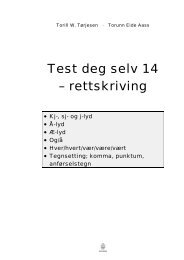

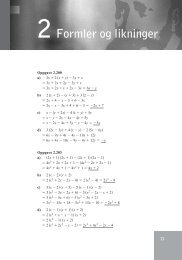
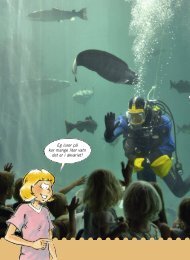
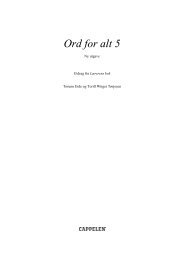
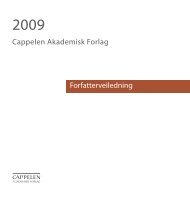
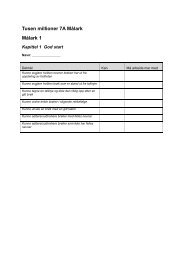
![Fakta [pdf] - Cappelen Damm](https://img.yumpu.com/50030129/1/190x253/fakta-pdf-cappelen-damm.jpg?quality=85)
